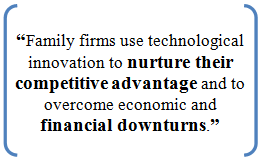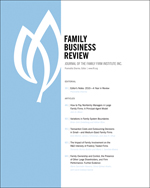Tech Innovation in the Family Context
Editor’s note: We are pleased to welcome Dr. Alfredo De Massis of the University of Bergamo, Italy, who published the lead article in the Family Business Review March issue, “Research on Technological Innovation in Family Firms: Present Debates and Future Directions,” co-authored by Federico Frattini of Politecnico di Milano, Italy, and Ulrich Lichtenthaler of the University of Mannheim, Germany.
My interest in this topic stemmed from the fact that what technological innovation management handbooks propose as universally applicable good practices cannot always be applied to family firms. In the past I have worked for many years as a management consultant for several family firms, and now I am used to having close and frequent interactions with many Italian family firms that are enrolled at the Center for Young & Family Enterprise (CYFE) of the University of Bergamo that I am co-directing. Throughout all this experience in innovation management projects, I was very surprised to see how often  traditional ingredients for success in technological innovation did not work in the specific context of family firms.
traditional ingredients for success in technological innovation did not work in the specific context of family firms.
It was surprising to see the high extent to which several well-established innovation management frameworks can be challenged and extended when we take into account the “family” variable. The high number of research gaps and opportunities for future research in the field of technological innovation in family firms, that have emerged from this study, is another unexpected result.
 This article has developed a future research agenda suggesting major research avenues to guide future theoretical and empirical research toward a better understanding of technological innovation in the context of family firms. This topic is highly relevant from a practical point of view because there is a growing body of empirical evidence showing that family firms use technological innovation to nurture their competitive advantage and to overcome economic and financial downturns. Innovative family firms have thus become an object of growing attention for management scholars and practitioners, and I think that this study has opened up a new avenue for future research at the intersection of technological innovation and family business. I hope innovation management scholars will start devoting increasing attention to the ubiquitous form of business organization of family firms.
This article has developed a future research agenda suggesting major research avenues to guide future theoretical and empirical research toward a better understanding of technological innovation in the context of family firms. This topic is highly relevant from a practical point of view because there is a growing body of empirical evidence showing that family firms use technological innovation to nurture their competitive advantage and to overcome economic and financial downturns. Innovative family firms have thus become an object of growing attention for management scholars and practitioners, and I think that this study has opened up a new avenue for future research at the intersection of technological innovation and family business. I hope innovation management scholars will start devoting increasing attention to the ubiquitous form of business organization of family firms.
Click here to read “Research on Technological Innovation in Family Firms: Present Debates and Future Directions” in Family Business Review.
 Prof. Alfredo De Massis, Ph.D. is Assistant Professor of Family Business at University of Bergamo (Italy), co-founder and Deputy Director of the research Center for Young and Family Enterprise (CYFE) of the same University. He is Chair of the STEP European Leadership Council and member of the Global Board of the STEP Project for Family Enterprising, Member of the Advisory Committee of the Family Enterprise Research Conference (FERC), and Program Chair-Elect for the “Special Interest Group on Family Business Research” at the European Academy of Management (EURAM). He has been TOFT Visiting Professor at Jonkoping International Business School (Sweden) and a visiting scholar at the Haskayne School of Business and the University of Manitoba (Canada). He has also been Manager in SCS Consulting, senior consultant in the Strategy service line of Accenture and financial analyst at the Italian Stock Exchange. His research and teaching is focused on innovation and technology management in family firms, family business goals, and intra-family succession. He has authored 6 books and more than 120 papers published on international and national journals and conference proceedings. His research has appeared, among others, in Entrepreneurship Theory & Practice, Journal of Product Innovation Management, Journal of Small Business Management, Family Business Review, Journal of Technology Transfer, International Journal of Entrepreneurial Behaviour & Research, International Journal of Technology Management. His most recent book (co-authored with Pramodita Sharma, Jess H. Chua and James J. Chrisman) is entitled Family Business Studies: an Annotated Bibliography, Edward Elgar, 2012.
Prof. Alfredo De Massis, Ph.D. is Assistant Professor of Family Business at University of Bergamo (Italy), co-founder and Deputy Director of the research Center for Young and Family Enterprise (CYFE) of the same University. He is Chair of the STEP European Leadership Council and member of the Global Board of the STEP Project for Family Enterprising, Member of the Advisory Committee of the Family Enterprise Research Conference (FERC), and Program Chair-Elect for the “Special Interest Group on Family Business Research” at the European Academy of Management (EURAM). He has been TOFT Visiting Professor at Jonkoping International Business School (Sweden) and a visiting scholar at the Haskayne School of Business and the University of Manitoba (Canada). He has also been Manager in SCS Consulting, senior consultant in the Strategy service line of Accenture and financial analyst at the Italian Stock Exchange. His research and teaching is focused on innovation and technology management in family firms, family business goals, and intra-family succession. He has authored 6 books and more than 120 papers published on international and national journals and conference proceedings. His research has appeared, among others, in Entrepreneurship Theory & Practice, Journal of Product Innovation Management, Journal of Small Business Management, Family Business Review, Journal of Technology Transfer, International Journal of Entrepreneurial Behaviour & Research, International Journal of Technology Management. His most recent book (co-authored with Pramodita Sharma, Jess H. Chua and James J. Chrisman) is entitled Family Business Studies: an Annotated Bibliography, Edward Elgar, 2012.
































































































